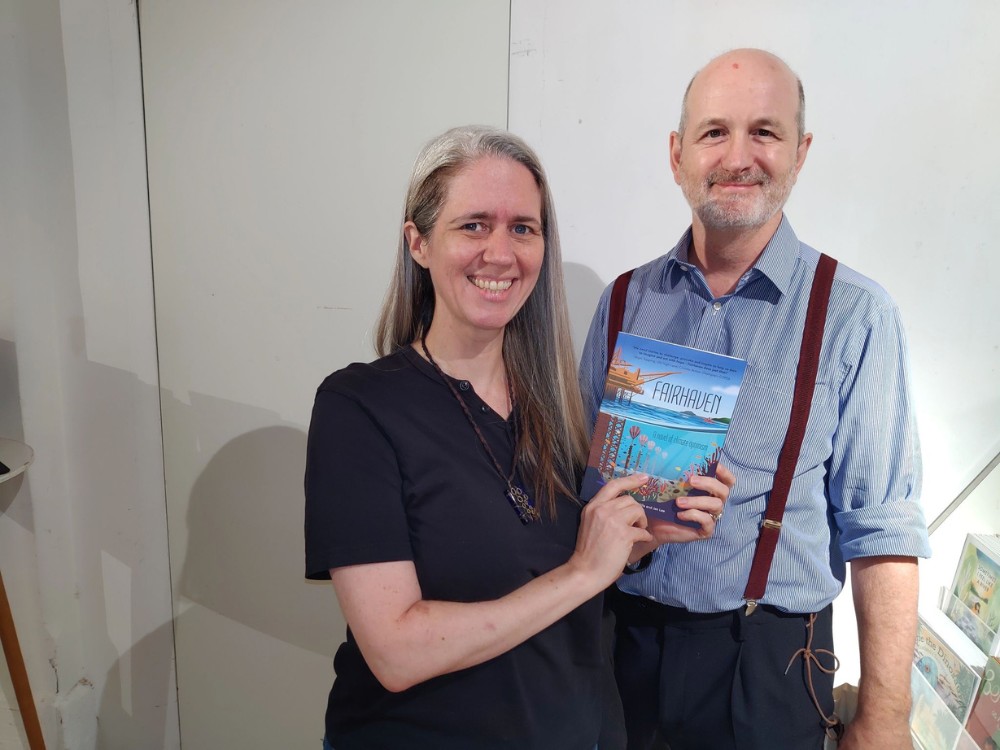In today’s world, climate change narratives often focus on the dire consequences. Still, co-authors Steve Willis and Genevieve Hilton (pen name, Jan Lee) have taken a different approach with ‘Fairhaven – a novel of climate optimism’. MOSAIC first arranged a meeting with Genevieve at the Global Sustainable Development Congress held in Bangkok in June. MOSAIC connected with Genevieve, who was attending as one of the panellists, representing her vast career in corporate sustainability and the book which she co-authored with Steve. The meeting led us to set up an interview with the co-authors; here’s their journey into environmental sustainability and what led to writing a fictional novel on climate action.
MOSAIC: Can you tell us what inspired this shift towards a more solution-oriented climate fiction?
Steve: Sure, the main inspiration behind Fairhaven was the realization that while a lot of climate fiction does a great job of raising awareness, it often leaves readers feeling overwhelmed or hopeless. We wanted to create something that still acknowledges the seriousness of the climate crisis but also provides a roadmap for addressing these challenges. By focusing on real, actionable solutions, we hope to inspire not just awareness but also a sense of action and urgency.
Genevieve: If you see, throughout history, fiction has had the power to shape public opinion and even influence real-world events. We saw an opportunity to harness this power in the context of climate change. Rather than just highlighting the problems, we wanted to use fiction to explore possible solutions and the solutions we might take to implement them. It’s about giving people hope instead of bringing in fear or hopelessness.
MOSAIC: You both come from different professional backgrounds. How did your collaboration come about, and how has it influenced the creation of Fairhaven?
Genevieve: Our collaboration started quite organically. I’ve been involved in corporate sustainability and E.S.G. for many years, and I’ve always had an interest in science fiction. I’d been sharing some of my thoughts and ideas on LinkedIn, where Steve found me. He reached out because he saw a connection between his hands-on work in environmental problem-solving and the themes I was exploring in my writing.
Steve: That’s true; I’ve spent a lot of time working on the ground in places like Malaysia, dealing with real-world environmental issues. When I saw Genevieve’s posts, I was intrigued and realized that we could combine my practical experience with her storytelling skills to create something that could make a real impact. Our different backgrounds were complementary, allowing us to approach the project from multiple angles.

MOSAIC: The Fairhaven project tackles several big ideas like climate adaptation, ocean restoration, and Arctic refreezing. Can you walk us through how these themes are explored in the book?
Steve: One of the key themes is climate adaptation, mainly how we can protect susceptible regions from the impacts of climate change. For the book, we focused on Penang, an island in Malaysia, as a case study. The story explores the tough decisions that must be made to safeguard the island from rising sea levels and frequent flooding. The objective is to show that while these challenges are daunting, they’re not insurmountable if we start planning and acting now.
Genevieve: Another central theme is ocean restoration. In the book, we introduce the concept of “sea orchards,” which are essentially artificial structures that promote marine biodiversity and help sequester carbon dioxide. Real-world phenomena, like how marine life clusters around abandoned oil platforms, inspire these sea orchards. The idea is to demonstrate that even areas of the ocean that heavily degraded could be revived with the right interventions.
Steve: The final theme is Arctic refreezing, a geoengineering solution to slow the melting of polar ice. This is perhaps the most speculative of the solutions we explore, but it’s grounded in real science. By increasing the ice cover in the Arctic, we could potentially slow down global warming and buy ourselves more time to implement other climate solutions. The idea is to provoke thought and discussion about the kinds of large-scale interventions that might be necessary as the climate crisis worsens.
MOSAIC: Fiction often has a decisive role in shaping public opinion and inspiring action. How do you see the Fairhaven project fitting into this tradition?
Genevieve: Fiction has always been influencing how people think and feel about important issues. Consider how “Uncle Tom’s Cabin” shaped public opinion on slavery or how “The Day After” influenced nuclear disarmament talks during the Cold War. With Fairhaven, we hope to continue this tradition by using fiction to not only raise awareness of climate issues but also to inspire readers to think critically about the solutions we need to implement.
Steve: We’re also hoping to reach a broad audience with this project. While the book is grounded in science and engineering, it’s written in a way that’s accessible to anyone, not just experts. We want people from all walks of life to read it and come away with a sense of hope and a better understanding of what’s possible if we take action now. It’s about changing the narrative from one of despair to one of possibility.

